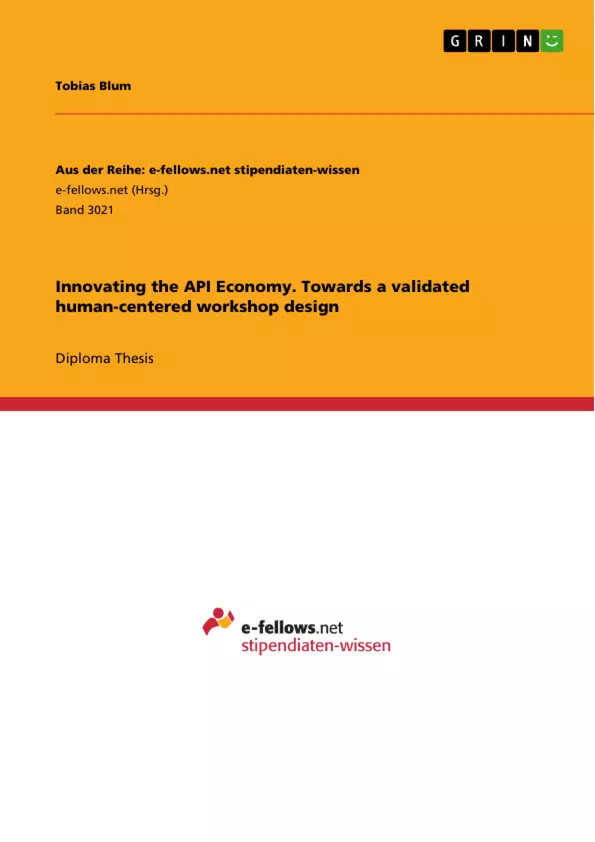The present thesis examines how a human-centered workshop design for finding use-cases for companies in the API economy could look like. For that aim the author used a qualitative exploration process and conducted interviews with 9 experts who have practical experiences in executing workshops and a theoretical background in the field of human-centered innovation to elaborate a first draft. The draft was then tested in four case studies to validate the methods. Based on the analysis of the workshop results and the participants’ feedback a final proposal towards a validated workshop design is presented. The thesis proposes that the best results are reached by implementing two workshop modules. The first module is focusing on the data, services and potential services of a company, connecting it with stakeholders. The second module elaborates the specific requirements of the use-case by discovering the needs directly with a potential client (inside out approach). In the first module the main methods are brainstorming activities, progression curves and the stakeholder map; in the second the central elements are an adapted customer journey (API Service Blueprint) and prototyping. As a result, the technical term “API” is transformed to an approachable topic in a human-centered workshop by getting to know the own company, the API consumer, the end-user and using prototyping to visualize APIs in interfaces the user interacts with. The findings are tailored into a workshop proposal which considers not only the specific methods but also further success factors to provide a complete guideline for a human-centered workshop design.
Inhaltsverzeichnis (Table of Contents)
- Introduction
- Relevance for research
- Research questions
- Research design & structure of thesis
- Research focus
- General Definitions
- Workshop
- API
- API Products
- API Economy
- Human-Centered Design
- Characteristics of APIs
- Technical Function
- Business Function
- Organizational Function
- Human-Centered Innovation
- Design Thinking
- HCD Swisscom
- Foresight Thinking
- Expert Interviews and research about the Workshop Design
- Framework for Interviews
- Interviews
- Results
- Expert Interview Findings
- Conclusions of expert interviews
- Draft
- Case Studies
- Workshop 1: Z-Squad
- Agenda
- Execution & Analysis
- Learnings
- Workshop 2: X-Squad
- Agenda
- Execution & Analysis
- Learnings
- Workshop 3: A-Squad
- Agenda
- Execution & Analysis
- Learnings
- Workshop 4 - Whole API Tribe
- General Factors
- Agenda & Participants
- Execution & Analysis
- Learnings
- Final design proposal & discussion of results
- Consideration of preconditions of workshop participants
- Final proposal for a workshop design
- Suitability of human-centered design methods for API workshops
- Success factors
Zielsetzung und Themenschwerpunkte (Objectives and Key Themes)
This master thesis investigates the development of a human-centered workshop design for identifying use cases for companies in the API economy. The research aims to establish a validated workshop structure through qualitative exploration, expert interviews, and case studies. The findings are then integrated into a comprehensive workshop proposal, providing a practical guideline for facilitating human-centered API workshops.
- Developing a human-centered workshop design for finding use cases in the API economy
- Validating the workshop design through expert interviews and case studies
- Analyzing the effectiveness of human-centered design methods for API workshops
- Identifying key success factors for implementing human-centered API workshops
- Creating a comprehensive workshop proposal for practical application
Zusammenfassung der Kapitel (Chapter Summaries)
The thesis begins by introducing the relevance of the research and defining key terms such as workshops, APIs, and the API economy. The author explores the characteristics of APIs, highlighting their technical, business, and organizational functions. Chapter 4 delves into human-centered innovation methodologies, specifically focusing on design thinking and foresight thinking. The research methodology is outlined in Chapter 5, which includes a framework for conducting expert interviews and analyzing the results.
The heart of the thesis lies in the case studies presented in Chapter 6. These case studies detail the implementation and analysis of four workshops, highlighting the challenges and opportunities of applying the proposed workshop design. The final chapter explores the preconditions for successful workshop implementation and presents the author’s final proposal for a validated workshop design. The author concludes by discussing the suitability of human-centered design methods for API workshops and outlining key success factors for effective implementation.
Schlüsselwörter (Keywords)
The primary keywords and themes explored in this thesis include API economy, human-centered design, workshop design, use-case identification, expert interviews, case studies, and validated workshop proposal. The work focuses on understanding the practical application of human-centered design principles in the context of API-driven innovation, exploring methods for facilitating collaborative workshops and identifying successful strategies for leveraging APIs within organizations.
Frequently Asked Questions
What is a human-centered workshop design for APIs?
It is a workshop structure that focuses on human needs and stakeholder value rather than just technical specifications to identify viable use-cases in the API economy.
How can the technical term "API" be made approachable?
By using prototyping to visualize APIs in interfaces and focusing on the API consumer and end-user needs through an "inside out" approach.
What are the two main modules of the proposed workshop?
The first module connects company services with stakeholders; the second discovers specific requirements by discovering needs directly with potential clients.
What methods are used in these API workshops?
Key methods include stakeholder maps, brainstorming, adapted customer journeys (API Service Blueprint), and rapid prototyping.
How was this workshop design validated?
The author conducted interviews with 9 experts and tested the draft in four separate case studies within companies like Swisscom.
- Quote paper
- Tobias Blum (Author), 2016, Innovating the API Economy. Towards a validated human-centered workshop design, Munich, GRIN Verlag, https://www.grin.com/document/459491



